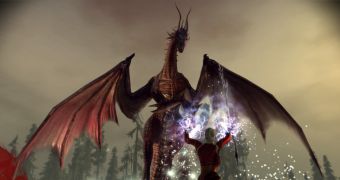A lot of people are complaining about the fact that Dragon Age: Origins is formulaic when it comes to the characters, the setting, and the story. Someone has even compiled a list of tropes which show up in all BioWare role playing games, from Baldur's Gate to Mass Effect. But after about 12 to 15 hours into Dragon Age: Origins, the player has plenty of reasons to be suspectious that BioWare is actually subverting quite a lot of them in its latest release.
Take for example the quest which needs to be completed to actually improve the health of Eamon Guerrein, who is the Arl of Redcliffe. The player needs to get some ashes of the prophet Andraste, who is seen as the direct representative of the main deity, The Maker. Of course, this involves a lot of dungeon crawling, a lot of fighting,and some choices. The main group guarding the ashes are worshiping a full-grown dragon, red as blood, and likely the one used in much of the promotional material for Dragon Age. In the game, a small cunning can make sure that a fight with this powerful foe is optional (I tried to take the creature down a couple of times and it's anything but a picnic, much, much tougher than taking on a Revenant complete with minions). But even as the dragon is avoided and as the ashes are used for good, this particular episode of the role playing game is very nice meditation on the beliefs and the philosophy of the in-game universe, with elements which can be transferred to the real world.
What is religion? Is it only a manifestation of force in the real world which inspired love, zeal, and sacrifice? Is it the belief in some long-lost history which lays out the moral compass for how people should actually behave in the present? Can violence ever be a solution to a problem of the spirit? These are all questions that the player will be pondering, even if he does not realize it, as he thinks about what to choose during the Andraste's Ashes quest in Dragon Age. And, whether he likes it or not, his choices might actually reflect some deeper understanding of the world.

 14 DAY TRIAL //
14 DAY TRIAL //